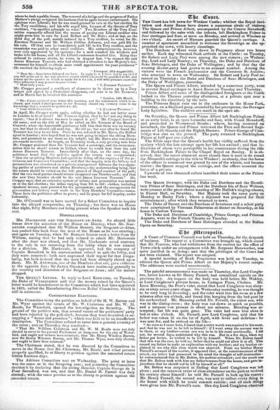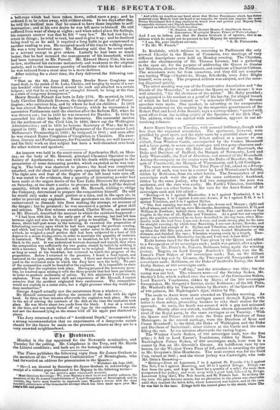31 t liattropolfs.
A Court of Common Council was held on Thursday, for the despatch of business. The report of a Committee was brought up, which stated that Mr. Pearson, who had withdrawn from the contest for the office of Town-clerk under an arrangement with Mr. Sergeant Merewether, was quite justified in so doing; and that the privileges of the Court bad not been violated. The report was adopted.
A special meeting of Bank Proprietors was held on Tuesday, to address the Queen and Prince Albert on ber Majesty's recent escape. The addresses were carried unanimously.
The painful announcement was made on Thursday, that Lord Congle- ton, better known as Sir Henry Parnell, had committed suicide on the previous day. An inquest on the body was held before Mr. Wakley, at Lord Congleton's private house, in eadogan Place, .Chelsea. Mr. Isaac Manning, the Peer's valet, stated that Lord Congleton was sixty- six or sixty-seven years of age. On Wednesday morning, he was thought to be very long in dresssing ; and the valet went into his room at a few minutes after ten o'clock, and found him banging from the bed-post by his neckerchief. Mr. Manning called Mr. Parnell, the eldest son, who was in the dining-room ; the body was cut down as quick as possible, and a surgeon was present in about ten minutes. Bleeding was at- tempted ; but life was quite gone. The valet had seen him alive in bed at nine o'clock. Mr. Parnell, now Lord Congleton, said that his father was taken ill on the 1st of April, with fever- and delirium he was sent for, and be arrived on the 7th-
" As soon as I came here, I found that a strict watch was required in his room, and that he was not to be left to himself : if I went away the servant was to be there, or my brother—some one was to be in his room continually. I did not, for several days, understand why this was. But in a few days, when my father got better, be wished to be left by himself. When Mr. Bolton found that this was the case, he told my father that he could not allow it at all. This caused my father to make an explanation with my brother; and my brother ex- plained to me why this close watch was observed. From my brother Henry Parnell's account of the matter, it appeared that, at the commencement of the attack, my father had presented to his mind the thought of self-destruction : he communicated this to Mr. Bolton, his medical attendant; and the result was that Mr. Bolton took with him my ?ether's razors from the house, and gave in- junctions that be should not be left by himself at all."
Mr. Bolton was surprised at finding that Lord Congleton was left alone ; and the renewed order of close attendance on the patient revived his anxiety about himself: he told Mr. Parnell to lock up his razors ; Mr. Henry Parnell, the second son, was sent to collect every thing in the house with which be could commit suicide ; and all such things were given into Mr. Parnell's care. One day Lord. Congleton observed
a bell-rope which had been taken down, coiled upon a peg ; and he ordered it to be taken away, with evident alarm. In ten days after that, he told the medical man that lie ceased to have those impulses to self- destruction ; and at his own desire he was left more to himself. He still suffered from want of sleep at nights ; and when asked about his feelings, his constant answer was that he felt " very low." He had lost his in- terest in things ; he tried to read, but used to give it up ; and he declined being read to, as he said it required a long habit to get accustomed to another reading to you. He occupied much of his time in walking about. He was a very reserved man : Mr. Manning said that be never spoke to a servant except to give orders. Latterly he had been so much better, that he had resumed the management of his household, which had been intrusted to Mr. Parnell. Mr. Edward Henry Cole, his son- in-law, attributed his extreme melancholy and weakness to the original malady, and to the immense quantity of medicine which he had taken : he was reduced from a stout man to a mere skeleton.
After retiring for a short time, the Jury delivered the following ver- dict— " That on the 8th June 1842, Henry Brooke Baron Congleton was found dead, in the parish of St. Luke, Chelsea, and hanging by means of a cer- tain kerchief which was fastened around his neck and attached to a certain bedpost ; and that he so hung and so strangled himself, he being at the time in a state of temporary derangement."
Henry Brooke Parnell was born in July 1776. He married, in 1801, Lady Caroline Elizabeth Dawson, the daughter of the Earl of Porter- lington ; who survives him, and by whom he had six children. In 1803 he was elected Member for Queen's County, which he represented in successive Parliaments until the election after the Reform Bill, when be was thrown out ; but in 1833 be was returned for Dundee. In 1812 he succeeded his elder brother in the baronetcy. His successful motion for the settlement of the Civil List, in 1830, threw out the Wellington Administration ; and in 1831 he became Secretary at War ; but he re- signed in 1832, He was appointed Paymaster of the Forces under Lord Melbourne's Premiership in 1835; be resigned in 1841 ; and soon after he was created Baron Congleton of Congleton, in Cheshire. His exer- tions, literary and Parliamentary, for Financial Reform, are well known ; and his little work on that subject has been a well-thumbed text-book for other writers and speakers.
An inquest was held in the court-room of Apothcaries Hall, on Mon- day, on the body of Mr. Hennell, principal Chemical Operator to the Society of Apothecaries ; who met with his death while engaged in the preparation of some detonating powder, which exploded as he was test- ing it. The body was shattered to pieces ; the head was completely smashed, and the chest laid entirely open, exposing the heart and lungs. The right arm and four of the fingers of the left hand were torn off. It was stated in the evidence, that a quantity of detonating powder had been made at the urgent desire of the East India Directors for shipment on Saturday, at too short a notice to procure more than half the desired quantity, which was six pounds ; and Mr. Hennell, wishing to oblige the Company, determined to prepare the composition himself. He said he would only make a small portion at a time, and in the open air, in order to prevent any explosion. Some gentlemen on the establishment endeavoured to dissuade him from making the attempt, on account of the danger ; but he persisted : he was accounted a person of great skill and science. The first witness examined, Charles Rivers, an assistant to Mr. Hennell, described the manner in which the accident happened-
" 1 had been with him in the early part of the morning, but had left him between eight and nine for the purpose of going to breakfast. When be came down, about half-past seven in the morning, he examined the preparation of fulminating mercury upon which he had been engaged the previous evening, and which had been left during the night under cover in the yard. At nine o'clock, he weighed a small portion that bad been subjected to a heat of 115 degrees in a steam drying-stove, in order to ascertain the quantity of moisture it contained. When Mr. Rennet' went to breakfast, he left it in a pan on a block in the yard. It was understood between deceased and myself, that when the composition was sufficiently dry two grains should be tested by striking it with a hammer. The bulk was afterwards to he weighed. Deceased was not so long as usual at his breakfast, but returned to watch the progress of the preparation. Before I returned to the premises, I heard a loud report, and hastened to the spot, suspecting the cause. I there saw deceased lying in the yard in the mutilated state in which the Jury have seen the body. No part of the composition could be found after the explosion. It is impossible to state positively how the explosion took place. Having prepared the necessary quan- tity, lie resolved upon mixing it with the three pounds that had been purchased, in order to produce uniformity of colour. To this admixture I attribute the explosion. From the known skill and experience of Mr. Hennell, I cannot conceive that the accident originated from carelessness. The composition would not explode in a moist state, but a slight pressure when dry would pro- duce combustion."
George Angell actually saw the occurrence from a window— Mr. Hennell commenced stirring the contents of the dish with his right hand. In three or four minutes afterwards the explosion took place. He was in the act of stirring the contents of the dish at the time the explosion took place. He was blown about two yards from the block. I was at a window at the time, and was nearly forced off any legs by the explosion. 1 ran out, and saw the deceased lying on the stones with all his upper part shattered to pieces.
The Jury returned a verdict of " Accidental Death," accompanied by a strong recommendation that no experiments of a dangerous nature should for the future be made on the premises, situate as they are in a very crowded neighbourhood.



























 Previous page
Previous page